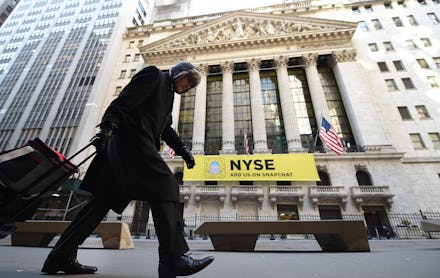Dodd-Frank Repeal: 4 things about the financial law Trump wants to kill

Though Hillary Clinton was often lambasted on the campaign trail for her Wall Street ties, President Donald Trump may now be one of the financial sector's closest allies.
Trump, whose administration has a number of Wall Street executives, is set to sign an executive order targeting the Dodd-Frank Act, the 2010 act that was passed in response to the 2008 global financial crisis. The Wall Street reform law imposes a number of regulations on banks and other institutions that could pose a threat to the global economy.
Trump referred to the act as a "disaster" on Monday, telling reporters that his administration would "do a big number" on the existing legislation.
An administration official cited by Reuters noted that the administration will not seek to "undo" the act completely, which is over 800 pages long, but will likely dismantle aspects of it through legislation and working with regulatory agencies.
Here are a few of the law's key components that could now be under attack:
Oversight agencies
In order to enforce its regulations and oversee the affected institutions, Dodd-Frank established a number of regulatory agencies. The largest of these are the Financial Stability Oversight Council, an agency within the U.S. Treasury Department tasked with monitoring the financial system and its stability, and the Consumer Financial Protection Bureau, which was established to protect consumers in the financial market and help regulate financial consumer protection laws. The FSOC also has the authority to break up banks if they are determined to be "too big to fail."
Other agencies established by Dodd-Frank include the Federal Insurance Office, which regulates the insurance industry; at the Securities and Exchange Commission, the Office of Credit Ratings, which regulates credit ratings agencies like Standard & Poor's and Moody's; and an Office of Women and Minority Inclusion at the SEC.
Volcker Rule
Among the numerous regulations set by Dodd-Frank is the Volcker Rule. The regulation specifically targets the speculatory investments banks made that contributed to the 2008 crisis by prohibiting banks from making proprietary trades and investments in hedge funds and private equity. The act also requires the Federal Reserve to impose restrictions on non-bank institutions that are engaged in these activities.
Trump's nominee for the treasury secretary position, hedge fund manager Stephen T. Mnuchin, has already vowed to "kill" the rule in his role at the treasury, the New York Times reported.
Derivatives
Dodd-Frank also imposed a number of regulations on derivatives, which are contracts used in order to speculate or hedge investments. Certain derivatives contracts were blamed for the 2008 crisis, most notably credit default swaps, which Time defined as "insurance-like contracts that promise to cover losses on certain securities in the event of a default."
Under Dodd-Frank, CNBC reported, credit default swaps and other risky derivatives are now regulated by the SEC or the Commodity Futures Trading Commission. Additionally, the law requires that the transactions take place publicly through a clearinghouse (similar to a stock exchange), so that these contracts will now be more transparent.
Mortgage regulations
In response to the subprime mortgage's contribution to the 2008 crisis, Dodd-Frank took on how mortgages are approved and regulated. New regulations set by the law include ensuring that borrowers will be able to repay their mortgage loan, expanding consumer protections on high-cost mortgages, requiring creditors to disclose more information about how much consumers can expect to pay and prohibiting unfair lending practices, such as financial incentives for more expensive, sub-prime loans.